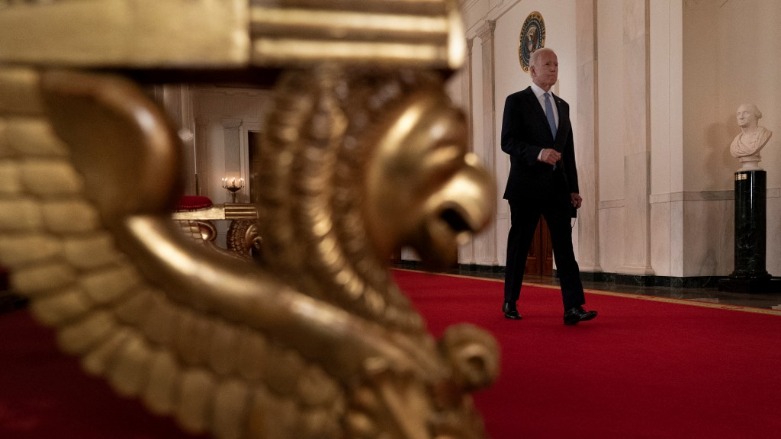Biden vows continued fight against ISIS in Iraq, Syria; defends Afghan decision; and redefines US goals in fighting terrorism
The US has no intrinsic interest in Afghanistan, Biden said, beyond that it not be used as a base to assault the US.

WASHINGTON DC (Kurdistan 24) – President Joe Biden made a televised address to the American people on Tuesday. It was one day after the longest war in US history—the 20-year war in Afghanistan—ended with the withdrawal of the last US troops.
At the same time, Biden emphasized that he would continue the fight against terrorism elsewhere, including in Iraq and Syria.
At the end of his speech, Biden took a subtle swipe at the George W. Bush administration, which not only sought to establish a democratic order in Afghanistan—but to transform the entire Middle East through democracy, as Bush embraced the neocon agenda, as it emerged in the period after 9/11.
As Biden affirmed, in explaining the strategic context for his decision on Afghanistan: this is “about ending an era of major military operations to remake other countries.”
No “Vital” US Interest in Afghanistan—in Contrast to Iraq, Syria
The US has no intrinsic interest in Afghanistan, Biden said, beyond that it not be used as a base to assault the US—which is also true of every other country in the world.
“If we had been attacked on September 11, 2001, from Yemen instead of Afghanistan, would we have ever gone to war in Afghanistan?,” Biden asked.
“The honest answer is ‘no,’” he continued. “That’s because we had no vital national interest in Afghanistan other than to prevent an attack on America’s homeland.”
Biden suggested that with the May 2, 2011, assassination of Osama bin Ladin, the US mission in Afghanistan had been completed (bin Ladin was actually in Pakistan, when he was killed.)
That was over a decade ago, and the threat of terrorism has now “metastasized across the world, well beyond Afghanistan,” Biden affirmed.
Biden then named the areas of the globe, where fighting terrorism remains an important US interest. Notably, they include Syria and Iraq.
“We face threats from al-Shabaab in Somalia; al Qaeda affiliates in Syria and the Arabian Peninsula; and ISIS attempting to create a caliphate in Syria and Iraq and establishing affiliates across Africa and Asia,” he said.
Biden’s affirmation that the US had a continued interest in fighting ISIS in Syria and Iraq is a reiteration of previous statements that he, and other US officials, have made, most recently the Counsel General in the Kurdistan Region, Robert Palladino, who made the same point on Monday in a televised press conference in Erbil.
Read More: US remains in Iraq, including Kurdistan Region, top diplomat reassures amid concerns
Bush’s Expansive Agenda: Transforming the Middle East through Democracy
This reporter first heard of how Bush’s post 9/11 agenda had grown far beyond confronting clearly-defined national security threats from Jim Woolsey, CIA Director under Bill Clinton, in March 2003, just before Operation Iraqi Freedom (OIF) began.
It was a small, elegant dinner in New York, where we had gathered in preparation for a lawsuit against Iraq: the two lawyers, the two plaintiffs, and the two witnesses (we actually won!)
One could tell that OIF would begin shortly, and Woolsey, almost certainly, had better information than anyone else, as he was on the Defense Policy Board, where the neocon agenda was aggressively promoted.
Woolsey’s understanding of what was about to happen was unreal. The US would invade Iraq, he said, and be welcomed by cheering crowds. US troops would then continue into Jordan, where there would be more cheering crowds, and they would go onto Egypt!
This reporter was so stunned by that lunacy, that I blurted out, “It’s not going to happen!” I hadn’t meant to make a scene, so I excused myself and left the table to recover.
Such ideas remained in the realm of Washington DC chatter, I long thought—until I read the memoirs of Lt. Gen. Daniel Bolger (US Army, Ret.), "Why we Lost". In his book, Bolger explains that the “A team,” which led the initial invasion of Iraq in March 2003, was pulled from the country in June to plan more wars in other countries.
They were replaced by a much less experienced “B team.” Perhaps, that did not really change the course of the war, although one would think that retaining the better, more experienced commanders would have produced a better outcome.
The White House was slow to recognize the difficulties emerging in Iraq and Afghanistan, and their objectives kept expanding, despite those difficulties.
In November 2003, Bush announced a new "forward strategy of freedom in the Middle East.” Not satisfied with that, following his re-election in November 2004, Bush developed an even more expansive agenda.
He articulated it in January 2005, when he gave his second inaugural address, even as the situation in Iraq, as well as Afghanistan, had deteriorated further in the intervening 14 months.
In his second inaugural, Bush pronounced, “It is the policy of the United States to seek and support the growth of democratic movements and institutions in every nation and culture, with the ultimate goal of ending tyranny in the world.”
Peggy Noonan was a primary speechwriter and Special Assistant to Ronald Reagan, who vigorously promoted democracy and is widely credited with having helped to precipitate the collapse of the Soviet Union.
Subsequently, Noonan became a columnist for The Wall Street Journal. She authored a blistering review of Bush’s second inaugural, which she characterized as “mission inebriation.”
“This declaration, which is not wrong by any means, seemed to me to land somewhere between dreamy and disturbing,” she wrote.
“Tyranny is a very bad thing and quite wicked, but one doesn’t expect we’re going to eradicate it any time soon,” she continued. “This is not heaven, it’s earth.”
